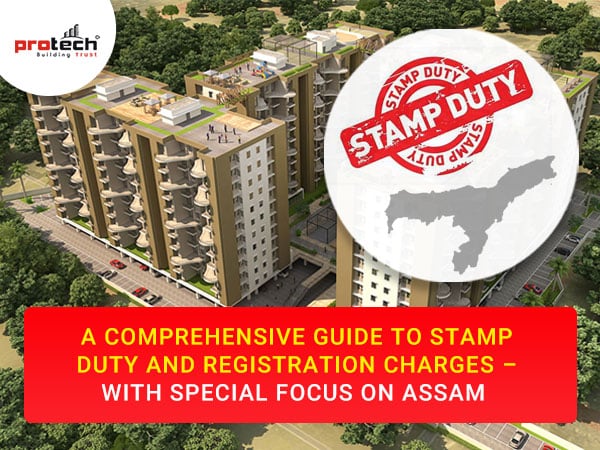Introduction

Purchasing a property is perhaps one of the biggest and most important financial decisions you will make in your entire life. While buying a property is a surreal experience, the entire process can be quite overwhelming, given the multiple formalities associated with it. Buying of property is a long drawn-out process that starts with a verbal agreement between the buyer and seller, document verification, payment of taxes like Stamp Duty and Registration Charges etc.
If you’re among the fortunate ones thinking of purchasing property- more specifically a house or a flat or any type of real estate, you must have come across these terms quite frequently- which may seem like financial jargon for someone new to this world of buying and selling real estate. That is precisely why we’ve curated this blog- for you to have a basic idea about these terms. You can thank us later!
We’ve also covered these taxes as applicable in various places of Assam and specifically in Guwahati. So, make sure you read till the end to have a fair idea about these basic but very important taxes that you need to pay to the concerned authorities.
STAMP DUTY
What is it?

Physical possession of the property is one of the most crucial steps in the process of buying property. However, mere physical possession is not enough. It is because we need a legal document to prove that the property is in our name. This is where Stamp Duty and Registration charges come in. When you pay these taxes, the property is legally transferred under your name.
It is a direct tax levied by the government on property transactions. It is levied by the respective State Governments, and payable under Section 3 of Indian Stamp Act, 1899. The payment applies to all recorded financial transactions including bills of exchange, letters of credit, promissory notes, property transactions, etc.
Any document on which stamp duty has been paid is a legally permissible document and is eligible to be presented as evidence in a court of law.
At what point is it payable?
It must be paid prior to the execution of the financial transactions, which means you have to pay it before completing and finalizing a financial transaction.
Alternatively, it is possible to pay the stamp duty on the following business day after the transaction execution date. Yet, any additional delay beyond that would result in a penalty of 2% per month up to the maximum of 200% of the deficit amount of stamp duty.
Therefore, it is advisable to pay it on time.
Documents that are subject to Stamp Duty
It is payable on all documents relating to the transfer of property such as Agreement to sell, Conveyance deed, Gift deed, Mortgage deed, Tenancy agreements, Lease deed, etc.
However, there is an exception to this. No Stamp Duty is applicable in the case of transfer by will.
Who bears the responsibility to pay these taxes?
Between the buyer and the seller, the general practice is that Stamp Duty is paid by the buyer of the property, except if there is an agreement on the contrary.
In the case of property exchange, it is paid by both parties equally.
Where to get Property Stamp Paper and what is the process of signing a transfer document with an adhesive stamp?
In some states, you can procure stamp paper through courts or government-authorized stamp vendors, while in others, now the Government of India has started a dedicated online portal (SHCIL – https://www.shcilestamp.com/) where one can get an e-stamp paper which is considered to be more secure. As per section 13 of the Indian Stamp Act of 1899, an individual executing an instrument need to cancel the stamp by writing his name or signature across the stamp. If the stamp is not canceled as mentioned, the document will be considered unstamped.
How is it calculated?
Although these taxes are established by the Central Government, it varies from state to state because it is levied by the state government. It is based on multiple factors such as the market value of the property, the circle rate, property type, intended use of the property, etc
Buyers can also calculate the Stamp Duty online using online calculators such as https://www.tatacapital.com/home-loan/stamp-duty-calculator.html
Benefits to Women Property Buyers
Some states and Union Territories such as Assam & Delhi have a provision for lower stamp duty and registration charges among women. This is done with an aim to increase the purchase of property by women, which in India’s case shows a dismal number. This will further promote women’s empowerment.
REGISTRATION CHARGES
What is Registration Charge?
In simple words, registration charges or registration fees are used interchangeably and refer to the fees paid for registration of documents like property documents. Once the stamp duty is paid for purchasing property, the document has to be registered under Indian Registration Act with a sub-registrar. The registrar must be of the jurisdiction where the property is situated.
The basic purpose of registration is to record the execution of the document. Only after registration is the ownership rights transferred to the person purchasing the property.
The Registration Charge is over and above the Stamp Duty and the rate varies from state to state.
Note: Both Stamp Duty and Registration Charges are not included in the home loan approved by the lender. The buyers are responsible for these expenses.
TAX BENEFITS ON STAMP DUTY AND REGISTRATION CHARGES

Income tax deduction can be claimed under section 80C of Income Tax Act on paid stamp duty and registration charges or any other expenses related to the transfer of property.
The current threshold of claiming tax deduction under 80C is 1.5 lakh. The tax claim must be made in the in the same financial year in which the house is purchased.
STAMP DUTY AND REGISTRATION CHARGES IN ASSAM
Compared to other Indian states, Assam has a comparatively higher taxes on real estate. These charges have seen a hike of 0.5% in recent times in Assam.
The table below shows the cost of registration of property in Assam.
| APPLICANT | REGISTRATION CHARGES | STAMP DUTY |
| Male | 8.5% | 6% |
| Female | 8.5% | 5% |
Methods to pay Stamp Duty in Assam
- Franking- The documents outlining details such as property agreement and stamp duty payment has to be prepared first. An authorized centre or a bank, after examining the documents, can accept the payment of these taxes and physically stamps the paper.
- Non-Judicial stamp paper- In this method, one has to buy the stamp paper from an authorized vendor, write down the terms of agreement and then get it signed by both parties.
- e-Stamping- In this method, payment is made online and hence is considered more convenient and secure. This process of payment is done through Stock Holding Corporation of India Limited.
Payment of Registration Charges in Assam
The procedure of property registration in Assam is governed by Registration (Assam Amendment) Act, 2013. The process involves the preparation of deeds, paying the applicable stamp duty and property registration fees for the deed to be legally recorded. Registration of property/Deed registration is managed by Inspector General of Registration, Revenue & Disaster Management, Government of Assam
As per the Assam Registration Act, if the immovable property has not been registered, such property will not be admissible as evidence in the court of law.
The time frame within which property registration will be completed is 15 days from the date of application in Assam.
Requirement of NOC for sale of property in Guwahati, Assam.
In Guwahati, the Guwahati Municipal Development Authority(GMDA) provides a No Objection Certificate(NOC) for which they charge an additional 1% of the total value of property.
Note: It must be noted that both these taxes has to be paid in whole and cannot be paid in installments.

Conclusion
The process of buying property for first time buyers can be quite taxing because of the extended processes and complicated legal terminologies. Therefore, it is always advisable to take expert guidance and from people who has purchased property before. There are a lot of online content too, that can be referred.
Overall, one must be clear about the required documents and registration processes needed in purchasing property. This would ensure an easy and hassle-free experience for all stakeholders involved in the process.
To read more about other important topics and themes regarding the most common questions, issues and dilemmas surrounding real estate as well as other concerns like Home Hacks, Home Décor etc, you can check out our other blogs here.

